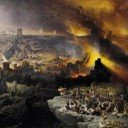Rev. 16:10 The fifth angel poured out his bowl on the throne of the beast, and its kingdom was plunged into darkness. People gnawed their tongues in anguish
Where the first four plagues could have been applied to Jerusalem, Rome or both, this one appears to be directed primarily at Rome with the mentioning of the “throne of the beast.” As we have seen previously and will note again in Chapter 17, the Beast (corporately speaking) is seen as the nation of Rome as it is the city that sits on the seven hills.
We also discovered that the term “beast” may also refer to the individual king or leader of that nation. So, at the time of John’s writing, the emperor under consideration would be Caesar Nero.
So, with this knowledge considered it is important to note the historical implication that did impact Jerusalem and the Jews at that time. What we are getting at is this; just because the plague may be directed at Rome does not mean it did not have an impact on Judea as well.
We have also noted previously that darkness over a land represents the fall or disturbance within the nation in question. This could internal turmoil, civil war, economic strife of even attack and conquering. Here we see darkness as the primary agent of the plague. The fact that it is directed against the “beast” means that the nation could be under tribulation and/or the emperor is the victim.
In this case it is quite possible that both the nation and the ruler are in view. Remember, that by this time both Rome and Israel have “covenanted” to persecute the Church of Jesus Christ. This starts with the combined effort to kill the Lord Himself and continued to the persecution of the followers of Christ, especially in the last few years of Nero’s reign.
In 68 AD, though, a darkness came over the nation of Rome with the suicide of Nero. There was no easy succession to the throne for any descendant as their were no descendants of Nero. This is unique in Rome’s history up to that point since all the previous emperors could point to a lineage traced back to Julius Caesar. But with Nero the line of Julius was severed.
This brought tremendous turmoil to the nation and the next two years were filled with chaos, upheaval, civil war and tyranny. In fact, the next three emperors to ascend to the throne reigned for no more than six months. Galba (the 7th) remained a little while (Rev 17) and reigned less than six months. He was followed by Otho and Vitellius who also could not least more than six months.
It wasn’t until 70 AD when Vespasian took the throne that order was restored. This ascendancy, though, had great impact on the nation of Rome and upon Israel.
Vespasian took control by starving the citizens of Rome. This may actually account for the idea that the inhabitants would gnaw at their tongues, a possible phrase representing hunger and emotional chaos.
Israel was impacted as well since Vaspasian was the general that was besieging the city of Jerusalem until the chaos in Rome erupted at the death of Nero. Vespasian would not forget the troubling zealots and had his heart set against the people of Judea from his time spent there. So, one of the first things that Vespasian did after taking control of the nation of Rome was to order the attack on the city to be led by his own son, Titus.
One must wonder what would have happened if Vespasian never took over the throne. Would another emperor have ordered the same vicious attack against the city? This proved to be a truly dark time for Israel as well. Their covenant was broken, their city destroyed and their Temple levelled with not one stone left upon another. All of this at the direct command and will of God.
This leads to the second reference to the reaction of the people. Rather than seeing their tribulation as coming as a result of the covenantal unfaithfulness and their horrific actions regarding Jesus and His church…
They did not repent of their deeds.





No comments:
Post a Comment